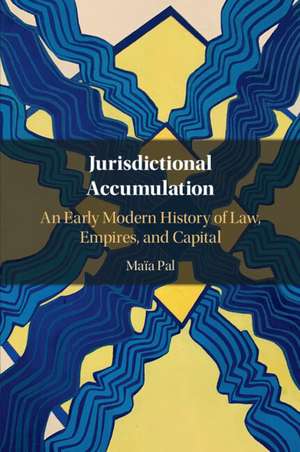Jurisdictional Accumulation: An Early Modern History of Law, Empires, and Capital
Autor Maïa Palen Limba Engleză Paperback – 18 mai 2022
| Toate formatele și edițiile | Preț | Express |
|---|---|---|
| Paperback (1) | 271.59 lei 43-57 zile | |
| Cambridge University Press – 18 mai 2022 | 271.59 lei 43-57 zile | |
| Hardback (1) | 729.73 lei 43-57 zile | |
| Cambridge University Press – 21 oct 2020 | 729.73 lei 43-57 zile |
Preț: 271.59 lei
Nou
Puncte Express: 407
Preț estimativ în valută:
51.97€ • 54.40$ • 43.00£
51.97€ • 54.40$ • 43.00£
Carte tipărită la comandă
Livrare economică 07-21 aprilie
Preluare comenzi: 021 569.72.76
Specificații
ISBN-13: 9781108739573
ISBN-10: 1108739571
Pagini: 364
Dimensiuni: 152 x 229 x 19 mm
Greutate: 0.49 kg
Editura: Cambridge University Press
Colecția Cambridge University Press
Locul publicării:Cambridge, United Kingdom
ISBN-10: 1108739571
Pagini: 364
Dimensiuni: 152 x 229 x 19 mm
Greutate: 0.49 kg
Editura: Cambridge University Press
Colecția Cambridge University Press
Locul publicării:Cambridge, United Kingdom
Cuprins
1. Early Modern Extraterritoriality; 2. Historical sociology, Marxism, and law; 3. Social property relations; 4. Ambassadors; 5. Consuls; 6. Colonial practices of jurisdictional accumulation; 7. Analytical crossroads: Dominium, consuls, and extraterritoriality; 8. Conclusion; Index.
Recenzii
'This book is an event. Maïa Pal's concept of Jurisdictional Accumulation, i.e. the development of actual practices of law, illuminates the shortcomings of conventional narratives of the history of international law. She convincingly demonstrates how much can be gained from making use of concepts of political economy for this analysis. Her focus on the practices of consuls opens up a new field of research for the historiography of exterritoriality.' Heide Gerstenberger, retired professor for 'Theory of State and Society' at the University of Bremen
'Anyone seriously interested in the early modern state system should read and ponder Maïa Pal's stimulating new study. Theoretically aware, based upon extensive research and deep thought, tightly argued and notably well written, it challenges many established assumptions and proposes a new paradigm, along the way providing important insights on topics such as extraterritoriality and the development of the Westphalian international order. Warmly recommended for both IR specialists and historians.' Hamish Scott, FBA, Jesus College, Oxford
'Maïa Pal's Jurisdictional Accumulation breaks new ground in the Historical Sociology of International Relations by providing an interdisciplinary, empirically rich, and theoretically sophisticated re-interpretation of the strategies of legal and mercantile sub-state actors in the formation of the institution of 'extra-territoriality'. Jurisdictional Accumulation is an ambitious intervention that fundamentally alters our understanding of early modern imperialism.' Benno Teschke, University of Sussex
'Maïa Pal's work is astonishing in many respects. Firstly, it develops a definitively innovative genesis of early modern empires. Through the concept of Jurisdictional Accumulation, this topic is seen under new light. Another surprising and significant aspect comes from the application of a Marxist analytical framework to the research findings. All-in-all, a landmark piece of work.' Jörg Ulbert, Université Bretagne Sud, France
'Pal's main research strength lies in her command of an extensive secondary literature from which she extracts substance to support her innovative argumentation and analysis … The book is to be welcomed as an able and convincing elaboration of this thesis [of jurisdictional accumulation]. But alongside original inquiry into early modern history, Jurisdictional Accumulation evinces a commitment to the development of a historical sociology of early modern empires. That is, Pal's goal is just as much the exposition of method as it is the presentation of original research. Legal historians may find that this may be its most lasting contribution to their work.' Christopher Tomlins, Legal Form
'Anyone seriously interested in the early modern state system should read and ponder Maïa Pal's stimulating new study. Theoretically aware, based upon extensive research and deep thought, tightly argued and notably well written, it challenges many established assumptions and proposes a new paradigm, along the way providing important insights on topics such as extraterritoriality and the development of the Westphalian international order. Warmly recommended for both IR specialists and historians.' Hamish Scott, FBA, Jesus College, Oxford
'Maïa Pal's Jurisdictional Accumulation breaks new ground in the Historical Sociology of International Relations by providing an interdisciplinary, empirically rich, and theoretically sophisticated re-interpretation of the strategies of legal and mercantile sub-state actors in the formation of the institution of 'extra-territoriality'. Jurisdictional Accumulation is an ambitious intervention that fundamentally alters our understanding of early modern imperialism.' Benno Teschke, University of Sussex
'Maïa Pal's work is astonishing in many respects. Firstly, it develops a definitively innovative genesis of early modern empires. Through the concept of Jurisdictional Accumulation, this topic is seen under new light. Another surprising and significant aspect comes from the application of a Marxist analytical framework to the research findings. All-in-all, a landmark piece of work.' Jörg Ulbert, Université Bretagne Sud, France
'Pal's main research strength lies in her command of an extensive secondary literature from which she extracts substance to support her innovative argumentation and analysis … The book is to be welcomed as an able and convincing elaboration of this thesis [of jurisdictional accumulation]. But alongside original inquiry into early modern history, Jurisdictional Accumulation evinces a commitment to the development of a historical sociology of early modern empires. That is, Pal's goal is just as much the exposition of method as it is the presentation of original research. Legal historians may find that this may be its most lasting contribution to their work.' Christopher Tomlins, Legal Form
Notă biografică
Descriere
Jurisdictional accumulation reveals varieties of early modern extraterritorial practices and how consuls, ambassadors, merchants and lawyers drove European imperial expansion.
